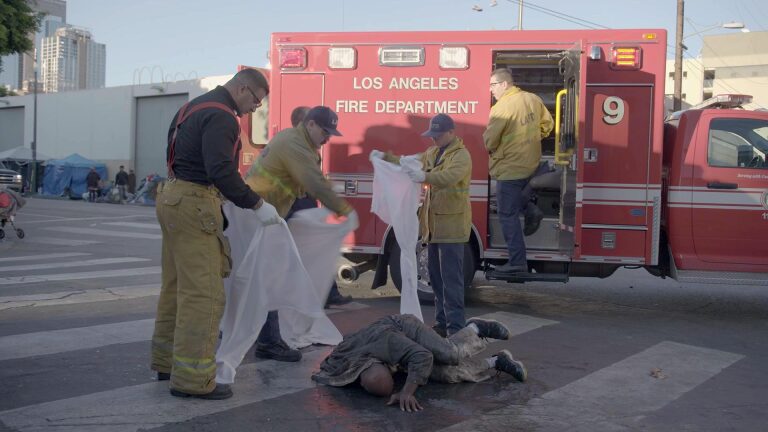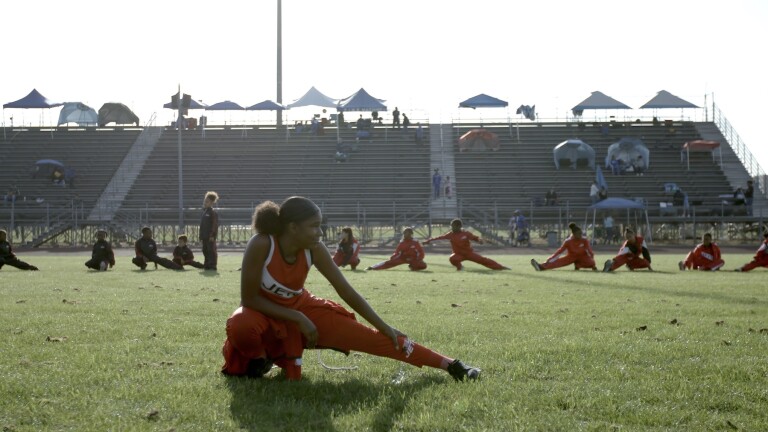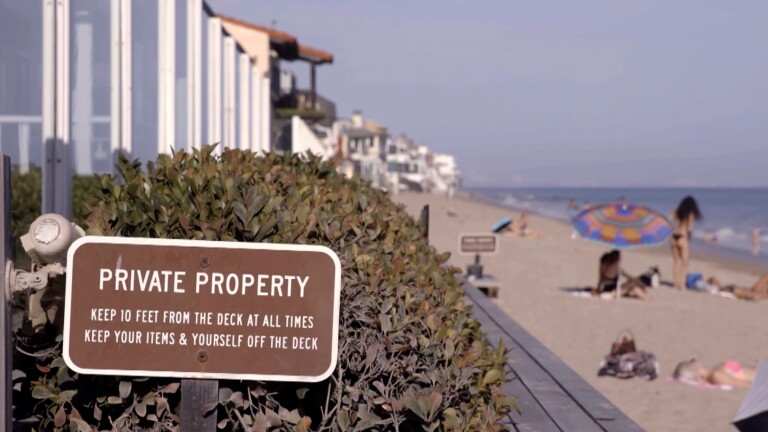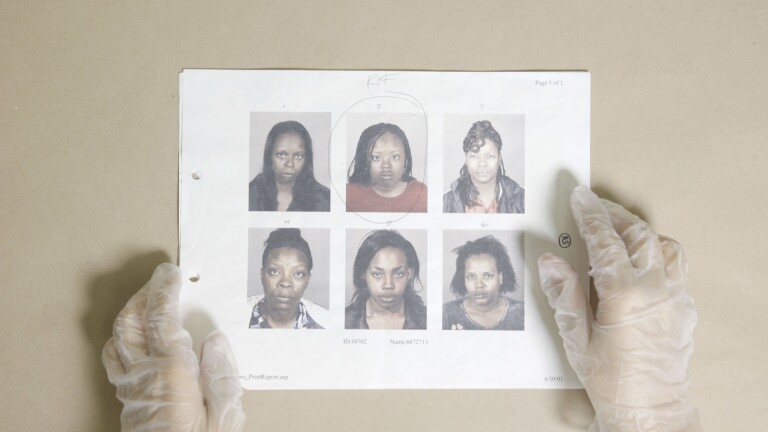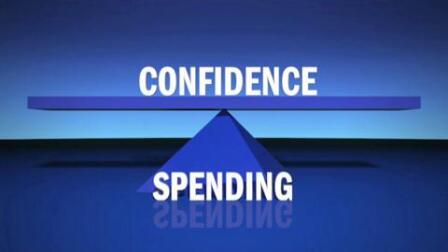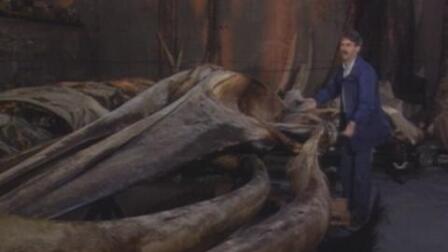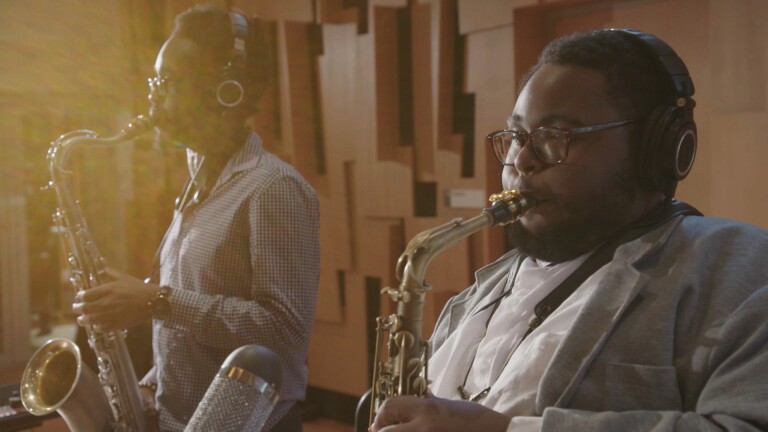
Herbie Hancock: All That's Jazz
TRANSCRIPT:
Okwu: Good evening and welcome to a special edition of SoCal Connected. I'm Michael Okwu. When I was a little boy, I used to spend hours listening to Herbie Hancock records, never imagining that one day I'd get to listen up close, right here at Walt Disney Concert Hall.
The other evening I got the chance to do just that when Hancock and conductor Gustavo Dudamel played to wide-eyed applause. After 14 Grammys, four gold records and an Oscar for best score, Hancock has added another feather to his musical cap as the creative force behind jazz for the L.A. Philharmonic.
But it wasn't until after I met him I realized that Herbie Hancock wants so much more. He's made an art of fusing musical styles, but a religion of connecting cultures. Recently, he gave us special backstage access to his home, to his office and to his private rituals. Rarely will you meet a man who is as unassuming and accessible as he is accomplished, who strikes all the right notes on stage, but also deep in his soul.
[Opens with archival footage]
"And this is Herbie Hancock!"
"On the keys, Herbie Hancock."
"My name is Herbie Hancock."
Herbie Hancock: I'm a really curious person, and I've been curious ever since I can remember. It's kind of, maybe, a pioneering spirit. I like the idea of trying to do the impossible.
Michael Okwu: He is one of the greatest American musicians of his time. You may know him from his years with legendary trumpeter Miles Davis, the composer of movies and TV shows — Fat Albert has a theme song thanks to him — or as the man who won a Grammy for his tribute to Joni Mitchell.
For half a century, Herbie Hancock has been breaking musical boundaries, and at 70 years old, he shows no signs of slowing down.
Okwu [to Hancock]: Do you ever age?
Hancock: [laughs]
Okwu: I mean it's incredible.
Hancock: Oh, thank you.
Okwu: But he's probably best known as an ambassador of jazz.
Okwu [to Hancock]: What is jazz?
Hancock: Jazz to me is the spirit of freedom. I mean real freedom. Freedom to explore. Freedom to express. Freedom to pour out your guts.
Okwu: But it was the discipline of classical music that launched Hancock's career. At just 11 years old, he played Mozart with the Chicago Symphony Orchestra.
And 60 years later, he's playing Gershwin with the world's most famous conductor. Hancock is now the Creative Chair for Jazz for the Los Angeles Philharmonic.
The pairing of Hancock and Gustavo Dudamel attracted the glitterati to the L.A. Phil's opening night gala at Walt Disney Concert Hall.
Okwu [on the red carpet]: What is it going to be like to hear legends like Herbie
Hancock and Gustavo Dudamel playing in the house you built?
Frank Gehry: Breathtaking!
Kareem Abdul-Jabbar: I see him as a jazz giant and someone who has been an innovator, and a premier performer of American music.
Quincy Jones: God left his hand on his shoulder longer than the other people, because Herbie's got it all. He's got the technique, the feeling, the experimental tendencies, and exploratory tendencies. He's got it all.
Okwu [to Hancock]: Big night tonight, huh?
Herbie: Yeah.
Okwu: It's a long road from Chicago jazz joints to the stage of Disney Concert Hall.
Hancock: The first thing I can think of that really hooked me was my second piano teacher, Mrs. Jordan. And I auditioned for her. And she said, "Oh, you read very well." And then she said, "Let me play something for you." She played Chopin with all the feeling, and I was so moved by that, I said, "Can you teach me how to play like that?" She said, "I can try!"
Okwu: Hancock may have stuck with classical music if it weren't for a chance encounter a few years later.
Hancock: What actually turned me onto jazz was when I heard someone my age playing my instrument, the acoustic piano, improvising and playing jazz. That made a big difference to me, because I thought, "Well, you know, you had to be at least 19 to play jazz." Older, right? Anyway, this guy was 14 or 15 and he could improvise very well. And I said, "I want to learn how to do that."
Okwu: He was a quick study, so quick Miles Davis took notice and hired him. Hancock was only 19.
Hancock: I was completely dumbfounded to find out I'm making a record with Miles Davis. And that was a record called "Seven Steps to Heaven."
To me Miles was Mr. Cool. He was the coolest guy I'd ever met.
Okwu [to Hancock]: Best thing he ever said to you?
Hancock: The best thing that Miles ever said to me was, "Don't play the butter notes."
Okwu: What does that mean, the butter notes?
Hancock: That's the same question I asked myself. I said, "What does that mean, 'don't play the butter notes?'" Let me tell you the story.
This was a time when I was feeling really depressed because I had kind of gotten to a bottle neck in my music and I felt like I was playing the same thing over and over again and I wasn't growing. I had kind of given up and Miles noticed that and he leaned over and he said, "Don't play the butter notes." And like you said, I am thinking what does that mean? But Miles said it so it must mean something, so I had to figure it out. So I thought, "What is butter? Fat? Oh! Fat. Excess! Oh." And so I figured out something about leaving certain notes out of chords that would make the chords really obvious.
And the interesting thing is that when I did take a solo, I tried to also avoid those certain obvious notes. And it did sound very erratic, and I got the biggest applause for that. I couldn't figure out what are they applauding for. Now, thinking back on it, I think they felt the purity of what I was doing. They felt the purity of the search. I think it just touched them somehow. And my playing was changed forever because of that one phrase that Miles said.
Okwu: But after five years with Miles, Hancock went his own way and began to experiment, blazing a trail that would make him a modern music icon by inventing new ways to manipulate sound — mixing jazz with rock, funk, and rhythm and blues.
Born out of that mix was Grammy Award-winning "Rockit," one of the biggest hits of 80s.
Chris Barton: That was where he was able to just keep moving, and "I'm not going to stay right here. This is interesting to me. I'm going to move this direction." And he kept that going, with being fascinated with what hip hop was doing in the 80s and and just going into "Rockit," and I mean that had scratching in a jazz — that's a radical thing for a jazz song to have.
Chris Barton is the jazz critic for the Los Angeles Times. He says Hancock changed the rules for jazz musicians, and not everyone liked what they heard.
Barton: At that time, from what I understand, it was just if anybody dared plug-in, that was the equivalent of Dylan plugging-in. You didn't do that if you were going to be this kind of jazz player.
Hancock: That's their problem. It's not mine. I have to be true to myself. I wanted to explore this territory and I did it. That was something I needed to do to satisfy an urge I felt. Because it takes courage to work outside the box, to be outside the box. And yet that's where the growth lies.
Okwu: I asked singer and Hancock friend Chaka Khan what it is about Herbie that inspires so much possibility.
Chaka Khan: I think a lot has to do with the fact that he's Buddhist. And that I think it opens one up to, you know, anything.
Okwu: Hancock has been a Buddhist for 40 years, an Eastern practice that he says helped him find his way in the world.
Hancock: When I perceive myself as a human being, all the walls go down, have no barriers, and so I am part of a much larger group. It's humanity itself.
Okwu: I imagine having that realization makes you an even better musician.
Hancock: It's like opening the floodgates. Now I think about purpose in music, which is why I've done the last few records with that in mind, particularly in my last album, The Imagine Project.
Okwu: The Imagine Project took Hancock on an international pilgrimage, recording music with some of the world's biggest artists to give voice to what he calls "the human orchestra of life."
Hancock: We want to build a culture of peace, and the only way we get there is for us to realize, "Wait a minute. I'm no different as a human being than any other person on the planet.
Okwu: It won him his 14th Grammy, recorded worldwide but produced right here at home.
Hancock [entering studio with Okwu]: So this is the place.
Okwu: The studio?
Hancock: That's my studio, yeah.
Okwu: It's a real man cave.
Hancock: Yep!
Okwu: For Hancock, it's a refuge.
Okwu [to Hancock]: What is it like to be in this room? Is this sanctuary? Do all the ideas just come flowing when you are underneath this ceiling?
Hancock: Well, the cool thing is it's in my house! Short commute!
Okwu: It's where the jazz icon reveals his inner kid in a candy store.
Okwu: Your background is in engineering, isn't it? So this is all very natural for you.
Hancock: Yeah, I was an electrical engineer major in college for two years. So I have a science background, so for me this is very comfortable.
Okwu: Wow, if I had one of these in my office, I would never get out of it.
Hancock: Well, that happens! It happens here, too!
Okwu: Upstairs in the living room, the "stage" is unplugged. Just Hancock and the piano. I took my shot.
[Both men play at the piano.]
Okwu [to Hancock]: What is the best song you've ever composed?
Hancock [starts playing]: Maybe...
Okwu: "Maiden Voyage?"
Hancock: Yeah.
Okwu: How long did it take you to compose that song?
Hancock: Well, the way it happened was I was asked to do a song for a commercial, a TV commercial.
Okwu: You're kidding! This came from a commercial?
Hancock: Yeah, for men's cologne.
Okwu: No, are you serious? But "Maiden Voyage" wasn't used for a commercial, was it?
Hancock: Yeah. The scene was a sophisticated jazz club, you know where everybody was dressed up in hip clothing, the chairs were high-backed chairs. Now, I don't know any jazz club that's like that, so I don't know where they got that from, unless it's some altered reality or something.
Okwu: But "Maiden Voyage" was nearly lost.
Hancock: I was working with Miles Davis' band at that time, and we had to fly to California. We were living in New York. And on the plane I was having a conversation with Wayne Shorter and this rhythm hit me.
And I grabbed a napkin from the flight attendant and wrote the rhythm down. And then we landed and I lost the napkin, and I didn't remember what the rhythm was.
Okwu: The melody came back to him later during a recording session. This time he wrote it down on a paper that wouldn't get lost.
Barton: Well, it's one of those songs that, I mean, it's sort of a strange comparision, but it's a little bit like a Beatles tune. As you come into listening to jazz and sort of exploring it, whether it's the first time you wander into that section of the record store, once you hear that melody for the first time, it stays with you. It's unmistakable.
Okwu: If "Maiden Voyage" is Hancock's greatest song, then "Round Midnight" may be his best film score. Considered by many to be the best film ever made about jazz, the score earned him an Oscar and allowed him to pay homage on screen to the jazz greats who went before him.
Barton : He's got this omnivorous approach to music. "Oh, I've got a chance to do a movie score. All right, this is going to be fun!" And off he goes. And, "Oh, I've got a chance to plug in or have a DJ work with me. All right, here I go." And it's commendable stuff for that.
Okwu [to Hancock]: What is the toughest part of the job?
Hancock: I realize that we have to constantly grow a new jazz audience.
Okwu: Hancock has his work cut out in a city where jazz struggles. Try counting the number of jazz clubs in L.A. and you won't get past one hand. The popular jazz club, Charlie O's, recently shut down, its parts sold off at auction.
Okwu [to Hancock]: Most people don't think about L.A. as being a jazz town. Is that a challenge for you as the director, the jazz director for the L.A. Phil?
Hancock: I'm just trying to put together packages in the programming that can be compelling, so that there will be a real audience there. That's an 18,000 seater, you know, the Hollywood Bowl.
Okwu: Jazz critic Barton says giving the people just what they want is playing it safe. He recently wrote an article critical of Hancock's lineups as jazz chair.
Okwu: You would've liked to have seen Herbie Hancock to do what?
Barton: Book an act that is going to challenge the audience and their expectations as much as he does.
Okwu: Recently the L.A. Times suggested that this year's lineup was less than stellar. I'm sure you probably saw the article. What do you have to say about that?
Hancock: I just heard about that and I haven't even read the whole thing. What he may not be considering is that — the thing we just talked about, which is growing a new audience for jazz. It's really important. How can the music survive if no one is going to listen to the music?
Okwu: In 2007, in typical Hancock style, he went outside of the box again and recruited a roster of pop royalty — from Leonard Cohen to Tina Turner — for an historic tribute to Joni Mitchell. The album, "River: The Joni Letters," earned Hancock a Grammy, the first jazz album to win for best album in 50 years.
Recently, Hancock brought Joni's jazz to the Hollywood Bowl. Before the show, we met up with him backstage, along with saxophonist Wayne Shorter, who he's been in the musical trenches with for almost half a century.
Okwu [to Hancock and Shorter]: You know, I'm looking at you two here, I mean you're both jazz icons. You're jazz greats. And you've been in dressing rooms like this all around the world, you know, hundreds if not thousands of times, probably, together. What happens in this moment before you perform? What are your thoughts?
Hancock: Well, because I've been practicing Buddhism now for almost 40 years and so has Wayne, one of the things often we do before we play is that we do the evening prayer.
Okwu: It's a ritual Hancock has never allowed to be filmed — until now.
Okwu [to Hancock]: And you do this before you perform because...?
Hancock: Because I want the true me to be out there performing, and this is a way to bring out the true me.
Okwu: An hour later, it's show time.
Barton: That was an amazing night. He took a solo and it was as if the earth moved a little bit, because everybody on stage felt it.
Okwu: And just two months later, there he is at rehearsal with Los Angeles Philharmonic conductor Gustavo Dudamel, talking ties. Yeah, neck ties.
Hancock: They tied it at the store, and I didn't take it loose.
Okwu: The rehearsal is seamless. And just a few hours later, the two titans of the L.A. music scene join forces. And you can't help being grateful to that piano teacher of his.

